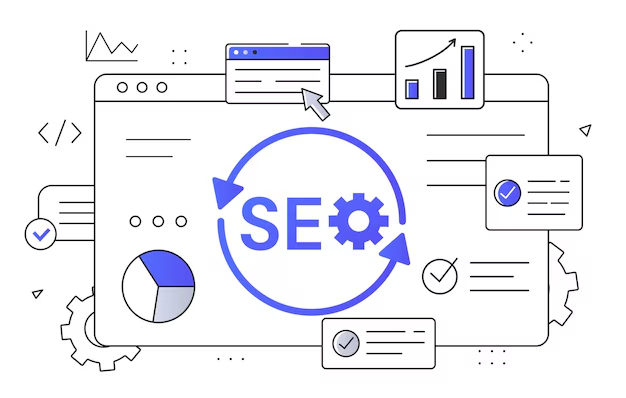Technical SEO: Make Your Website Performance Better
SEO (Search Engine Optimization) is essential for websites aiming to rank higher on search engines like Google. It consists of three main parts: On-Page SEO which helps to optimize website content, keywords, and meta tags. Off-Page SEO which is used for Building backlinks and social signals and Technical SEO which Enhances the website’s technical aspects for better performance.
You should know about Technical SEO, which improves website speed, structure, security, and indexing. Without proper technical SEO, search engines may struggle to understand and rank your site. We will help you inform you about the aspects of technical SEO optimization, its importance, key elements, best practices, and how businesses can benefit from it.
Our Valued Clients
Explore our esteemed clients whom we’ve successfully supported with top-notch Digital Marketing and Website Development services.









What is Technical SEO?
Technical SEO means making a website work better so that search engines like Google can easily understand and show it to users. It includes improving site speed, making the website mobile-friendly, keeping it secure, and using structured data to help search engines know what your content is about. A well-optimized website loads fast, gives a better user experience, and ranks higher in search results.
Without technical SEO optimization, a website may not perform well, leading to less traffic and lower rankings. It is the foundation that helps all other SEO technical optimization efforts succeed.

Why is Technical SEO Important?
Many website owners focus on content and backlinks but overlook technical SEO. However, a website with technical flaws may not rank well despite having quality content. Issues like slow loading speed, broken links, or security vulnerabilities can reduce visibility and user engagement.
By addressing these problems, technical SEO optimization helps improve website functionality, making it easier for search engines to index and rank your site. A properly optimized site enhances user experience, decreases bounce rates, and increases conversions.
Key Elements of Technical SEO
To make your website perform better and rank higher, technical SEO optimization is important. It helps search engines understand and display your site properly. Here are key ways to improve your website:
1. Website Speed Optimization
A slow website can frustrate users and make them leave. Google prefers fast-loading websites because they provide a better experience. Here’s how you can improve speed:
- Optimize images by compressing them so they load faster without losing quality.
- Enable browser caching so returning visitors don’t have to load everything again.
- Use a Content Delivery Network (CDN) to load content quickly worldwide.
- Reduce scripts and unnecessary plugins to minimize HTTP requests.
- Enable GZIP compression to shrink file sizes and improve speed.
- Use Lazy Loading so images load only when they are needed.
Google measures page experience using Core Web Vitals, which include:
- Largest Contentful Paint (LCP) – How fast the main content loads.
- First Input Delay (FID) – How quickly the page responds to user actions.
Improving these ensures a better user experience and higher rank
2. Mobile-Friendliness
More people use mobile devices than computers for browsing. Google uses mobile-first indexing, meaning your site’s mobile version matters most for ranking. To make your site mobile-friendly:
- Use a responsive design that adjusts to different screen sizes.
- Optimize images for mobile so pages don’t load slowly.
- Improve navigation so users can easily find what they need.
- Use Accelerated Mobile Pages (AMP) to speed up mobile pages.
A mobile-friendly website attracts more visitors and ranks higher on search engines.
3. Secure Your Website with HTTPS
Google prefers secure websites. HTTPS protects users by encrypting data, making it essential for SEO. To secure your website:
- Get an SSL certificate from a trusted provider.
- Redirect HTTP pages to HTTPS to avoid errors and maintain rankings.
- Regularly check for security updates to protect against hackers.
A secure website builds trust and improves search engine rankings.
4. Crawlability and Indexing
Search engines need to crawl and index your site properly to rank it. Here’s how to help them:
- Submit an XML sitemap in Google Search Console so search engines find all pages.
- Fix broken links so users and search engines don’t hit dead ends.
- Use a robots.txt file to guide search engines on what to crawl.
- Add canonical tags to avoid duplicate content issues.
- Improve website structure so it’s easy to navigate.
If search engines can’t properly read your site, it won’t rank well.
5. Structured Data and Schema Markup
Adding structured data helps search engines understand your content better and show rich results like star ratings or product details. To implement this:
- Use schema markup for reviews, articles, and businesses.
- Add structured data to improve search visibility.
- Test it with Google’s Rich Results Test to ensure it works.
This boosts click-through rates and improves your SEO.
5. Optimized URL Structure
A well-structured URL helps search engines and users understand what a page is about. Best practices include:
- Keeping URLs short, simple, and descriptive.
- Using hyphens (-) instead of underscores (_) to separate words.
- Avoiding random numbers and unnecessary parameters.
- Including keywords naturally.
For example, instead of:
🚫 www.example.com/p=1234
Use:
✅ www.example.com/technical-seo-optimization
A clean URL structure makes it easier for search engines to rank your pages.
How to Perform a Technical SEO Audit
A technical SEO audit helps you find and fix issues that may be stopping your website from ranking well on search engines. It ensures your website is fast, secure, and easy for search engines to understand. Here’s how to do it step by step:
- Analyze Website Speed : A slow website can make visitors leave, and Google prefers fast websites. To check your site speed use Google PageSpeed Insights to test your page loading time. Optimize images by compressing them without losing quality. Enable browser caching so returning visitors don’t have to reload everything. Minimize unnecessary scripts and plugins that slow down your website. A fast website improves user experience and helps with better rankings.
- Check Mobile Usability : More people browse the internet on mobile devices than on desktops. Google uses mobile-first indexing, meaning it ranks your site based on the mobile version. To check if your website is mobile-friendly: Use Google’s Mobile-Friendly Test to see how well your site works on mobile. Ensure responsive design, so your site adapts to different screen sizes. Improve mobile navigation, so users can easily find what they need. Optimize images and text so they load properly on small screens. A mobile-friendly website attracts more visitors and improves your SEO rankings.
- Fix Broken Links : Broken links can frustrate visitors and stop search engines from crawling your site properly. To find and fix them: Use tools like Screaming Frog or Google Search Console to identify broken links. Update or remove broken links so users don’t land on error pages. Use 301 redirects to guide users to the correct page if content has moved. Fixing broken links improves user experience and helps search engines crawl your site efficiently.
- Validate Structured Data : Structured data helps search engines understand your website better and can make your pages appear with extra details (rich results) in search results. To check if your structured data is working correctly: Use Google’s Structured Data Testing Tool to find errors. Implement schema markup for articles, reviews, businesses, and products. Fix any errors to ensure search engines display rich results for your site. Proper structured data can increase click-through rates and improve your rankings.
- Optimize Site Architecture : A well-organized website makes it easier for search engines and users to navigate. To improve site structure: Ensure a clear navigation menu so visitors can find what they need quickly. Use categories and subcategories to organize content. Keep important pages easy to access within 3 clicks from the homepage. A well-structured website helps search engines understand your content and improves user experience.
- Improve Internal Linking : Internal links help users and search engines navigate your site. To optimize internal linking: Link relevant pages together to guide users to useful content. Use descriptive anchor text so users and search engines understand the link’s purpose. Avoid too many links on one page, as it can be confusing. Good internal linking improves SEO and keeps visitors on your site longer.
- Check for Duplicate Content : Duplicate content confuses search engines and can hurt your rankings. Use Copyscape or Google Search Console to detect duplicate pages. Remove or rewrite duplicate content to make each page unique. Use canonical tags to tell search engines which version of a page is the original. Unique content ensures search engines rank your pages correctly.
- Monitor and Fix Crawl Errors : Crawl errors happen when search engines can’t access parts of your website. To check for these errors: Use Google Search Console to find crawl issues. Fix broken pages, missing redirects, and server errors. Ensure search engines can access your important pages without issues. Fixing crawl errors helps search engines index your site properly and improves rankings.
Technical SEO for E-Commerce Websites
E-commerce websites require specific technical SEO strategies to rank effectively: Use breadcrumb navigation to improve site structure. Optimize category and product pages for fast loading. Implement structured data for product descriptions and reviews. Prevent duplicate content by using canonical tags. Ensure smooth checkout experiences to reduce cart abandonment. Use faceted navigation properly to avoid indexing duplicate pages.
Benefits of Technical SEO:
By improving technical SEO optimization, businesses can enhance search engine rankings, user experience, and website performance. Whether you have a business website or an eCommerce store, technical SEO is crucial for long-term success. If you need professional technical SEO services, contact Fillip Technologies today!
Why Fillip Technologies for Best Technical SEO Services?
At Fillip Technologies, we provide expert technical SEO analysis to improve your website’s performance and rankings. Our team focuses on optimizing site speed, security, indexing, and structured data to help businesses succeed online. With years of experience and proven results, we ensure your website meets the latest SEO standards.
We offer:
- Comprehensive SEO technical optimization services.
- Technical SEO for eCommerce to enhance product visibility.
- Regular audits to fix technical issues and maintain performance.
- Expertise in implementing structured data and schema markup.
With Fillip Technologies, your website will be fully optimized for search engines, ensuring better traffic, conversions, and business growth.
Frequently Asked Question
Technical SEO involves optimizing a website’s backend elements like speed, security, and crawlability to improve search engine rankings.
While on-page SEO focuses on content and keywords, technical SEO enhances the website’s structure and performance for better indexing.
A fast website improves user experience and increases search rankings, as Google prioritizes sites that load quickly.
Use tools like Google Search Console, PageSpeed Insights, and Screaming Frog to analyze technical issues and fix them.
Structured data helps search engines understand website content better, enabling enhanced search result features like rich snippets.
It’s recommended to conduct a technical SEO audit every 3-6 months to identify and fix any issues affecting your site’s performance.


